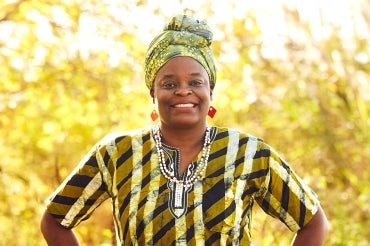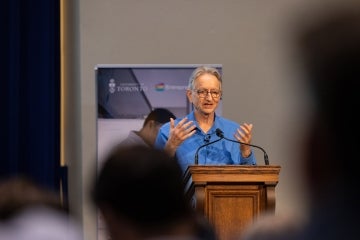U of T researcher Roberta Timothy lays groundwork for master's program in Black health

Published: July 15, 2021
As the first Black health lead at the University of Toronto’s Dalla Lana School of Public Health, one of Roberta Timothy’s projects is developing a master of public health program (MPH) in Black Health.
She says the two-year program, which will take approximately 18 months to put together, will revolutionize public health and unearth important Black health experiences.
“We’re talking about curriculum change and how to progress,” says Timothy, who is an assistant professor at the school. “We need Black communities and Black voices in this work. This program is going to be an example of how we do that. I am excited.”
The MPH will look at Black health and well-being, the impact of anti-racism on health, maternal health, the intersectionality of Black Elders and children, the relationship between these generations and its effect on community health.
Timothy would also like to explore chronic illnesses among Black people and their treatment within the health-care system. The intersectional perspective is key, she says, since the Black community is not homogeneous – a fact she says is often overlooked in conversations about Black health.
“There are Black folks from working-class neighbourhoods, Black refugees, Black queer folks, Black people living with disabilities, Black Elders and Black children. We are really looking at the impact of health outcomes based on anti-Black racism and wellness for all these different people.”
Race is a salient factor for many Black people, adds Timothy. However, she says that, within the community, there are intersections that make the understanding of Black health needs much more complex – and that resisting anti-Black racism helps to dismantle homogeneity.
She hopes the new curriculum will help demonstrate what types of wellness systems are working in the Black community.
Timothy’s target audience is primarily Black researchers and the next generation of Black health practitioners, but she says allies will have the opportunity to take the program as well.
“There’s a lack of Black students in public health,” she says. “They’re not getting enough learning about Black health in the current curriculum. This is for us, for our communities and for folks who want to do solidarity work.”
The program comes at a time when race-based data confirms that Black people have been disproportionately affected by the COVID-19 pandemic. “They didn’t include us in COVID-19,” says Timothy, “but we are going to include ourselves, our communities, and take our wellness back and initiate interventions that will support it.”
Timothy says she hopes to garner enough funding to support practica, post-doctoral positions and researchers to build the program’s foundation.
“One program cannot do everything in dismantling anti-Black racism, but it can definitely challenge white supremacy, and create spaces for Black health growth and wellness. I hope that other programs are going to pop up as a result of ours. It’s a part of a larger legacy of Black resistance and Black health.”



